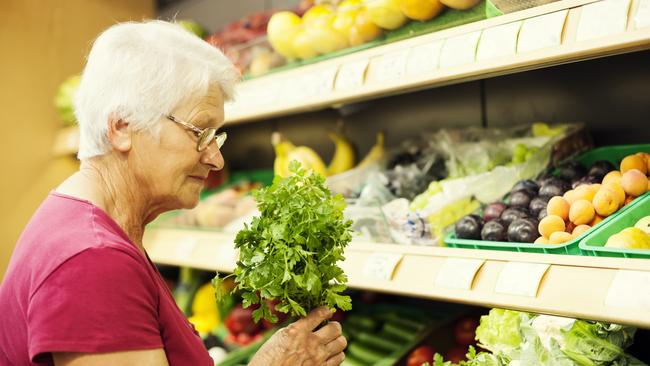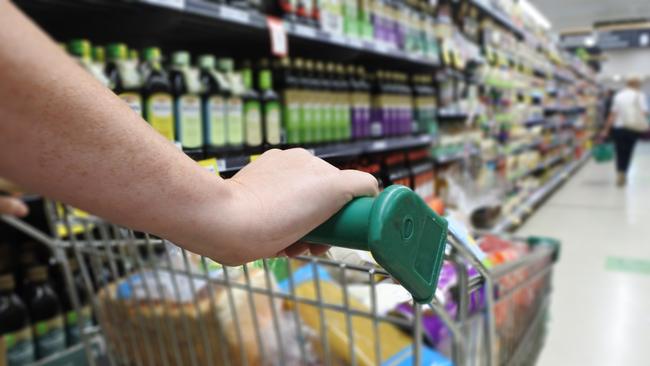Food inflation spikes in April, warns UBS, led by rising prices for fresh food
Food inflation has surprisingly spiked in April to near 10 per cent, warns investment bank UBS, led by rising prices for fresh food. But Coles has dismissed the report as inaccurate.

Business
Don't miss out on the headlines from Business. Followed categories will be added to My News.
Hopes that soaring food and grocery prices were easing to relieve pressures on household budgets have been dashed after investment bank UBS warned food inflation reached a new peak of 9.6 per cent in April, as supply chain and labour pressures continue to cause pain at the checkout for shoppers.
Much of the pain is coming from fresh produce, with fresh food inflation spiking to 9.9 per cent in April, although that was slightly down from inflation of 10.1 per cent in March.
UBS analyst Shaun Cousins described the increasing rate of food inflation as a “surprise” and inconsistent with recent reports from heavyweights Woolworths and Coles of food prices coming down.
The bank tracks more than 60,000 food and grocery prices to produce its ‘Price Tracker’ monitor and despite supermarket sector reports that prices were coming back from recent inflationary spikes, the cost of a basket of items at the retailers hit a new peak in April.
News of the consistently high and stubborn food prices will place further pressures on households already battling other cost of living pressures such as rising mortgages and rents.
According to UBS, food inflation, excluding tobacco, averaged 9.6 per cent in April, up from 9.4 per cent in March and 9.1 per cent for the third quarter.
In terms of the major supermarket chains, Coles is now ahead of Woolworths with Coles inflation up 10.5 per cent in April against 9.1 per cent in March, with Woolworths’ food inflation registering 8.7 per cent growth in April and 9.7 per cent in March.

However, retail giant Coles has dismissed the UBS food inflation report as “not an accurate reflection” of the way the chain calculates inflation across its aisles and online.
“UBS’s sample data does not capture our full range of products and does not capture changes in customer buying behaviours which impact our sales volumes and product mix,” a Coles spokeswoman said when contacted by The Australian.
“This is integral to capturing an accurate reflection of overall supermarket inflation. UBS used the same price tracker for a report ahead of the third quarter 2023 results and reported Coles inflation at 9 per cent. Our official inflation figure was reported significantly lower at 6.2 per cent.”
Meanwhile, in terms of the key supermarket categories, fresh food inflation was 9.9 per cent in April, down from 10.1 per cent in March but up against 8.9 per cent in February. Dry grocery inflation rose 9.4 per cent in April against 9 per cent in March.
“While monthly pricing data is volatile, especially fresh given supply variability, it is valuable given the current period of materially high food inflation. The increasing rate of food inflation is a surprise, and inconsistent with the declines reported by Coles and Woolworths in the third quarter,” said Mr Cousins.
He said the reason for the stubbornly high food and grocery inflation could stem from supply chain costs and labour costs.
“We suggest the achievement of a new peak in food inflation (ex tobacco) is due to ongoing cost pressures on suppliers due to commodities and the domestic supply chain including labour.”
Mr Cousins expects a moderation in dry grocery inflation, while fresh inflation is expected to slow due to improving supply.
“Yet dry grocery inflation is likely to remain elevated as pressures on commodities and the domestic supply chain including labour continue in calendar 2023, although the frequency of price rises may reduce.”
The rise in inflationary pressures at the major supermarkets is in stark contrast to recent comments from the retailer at their latest quarterly updates where there was a signal that near-double digit inflation in key food and groceries was starting to moderate.
In late April then outgoing Coles boss Steven Cain said inflation was starting to moderate. This was also shown in its results with Coles reporting at the time that total supermarkets price inflation of 6.2 per cent slowed in the third quarter, compared to 7.7 per cent in the second quarter with packaged groceries inflation of 7.2 per cent (7.9 per cent in the second quarter) and fresh food inflation of 4.1 per cent (7.1 per cent in the second quarter).
At his quarterly sales update, Woolworths boss Brad Banducci said he shared the frustration of his shoppers who were facing steeper prices but that there was a sense those inflationary peaks were starting to flatten.
“Looking ahead, we are seeing signs of overall inflation moderate in food,” Mr Banducci said in early May. “However, in many areas inflation remains frustratingly elevated and we need to continue to work hard to provide our customers with great value across their shopping basket.”
The UBS report also said higher prices at the checkout would push more customers to switch to private label groceries, which both Woolworths and Coles have said was a growing trend at their stores.
More Coverage
Originally published as Food inflation spikes in April, warns UBS, led by rising prices for fresh food





